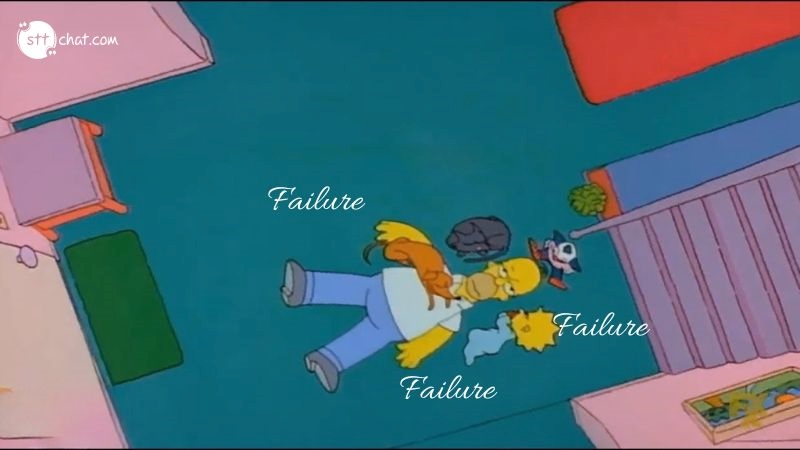You tried your best and you failed miserably
- Homer Simpson -
Homer Simpson, the lovable but often bumbling protagonist of the long-running animated series "The Simpsons," has provided audiences with countless memorable quotes over the years. One such quote, "You tried your best and you failed miserably" is particularly noteworthy. On the surface, it may seem like a simple, humorous remark, but upon closer inspection, it reveals deeper layers of meaning and social commentary. In this blog, we'll delve into the nuances of this quote, exploring its implications and the broader context within which it was delivered.
1.Homer Simpson’s quote“You tried your best and you failed miserably” meaning
In "The Simpsons," Homer often finds himself in absurd situations, frequently due to his own poor decisions. This particular quote comes from the episode titled "Burns' Heir," where Mr. Burns, the wealthy and ruthless owner of the Springfield Nuclear Power Plant, is searching for an heir. After a series of unfortunate events, Homer attempts to console his son, Bart, who has failed in a task. His attempt at consolation is the ironically discouraging statement: "You tried your best and you failed miserably. The lesson is: never try."

Lesson from Homer Simpson quote that everything is a destiny
2.Homer Simpson humor to you
3.Deeper implications of Homer Simspon’ quote
While the quote is undoubtedly funny, it also serves as a critique of defeatism and a reflection of Homer's character. Homer is known for his laziness and lack of ambition, often opting for the path of least resistance. His advice to Bart encapsulates this worldview, suggesting that avoiding effort is preferable to risking failure. This mentality is a satirical take on the defeatist attitudes that can sometimes pervade society, where fear of failure leads to inaction and complacency.
4.The role of failure in growth for you
Contrary to Homer’s advice, failure is often a crucial component of personal and professional growth. Many successful individuals and innovators emphasize the importance of learning from failures. Thomas Edison, for example, famously stated, "I have not failed. I've just found 10,000 ways that won't work." This perspective on failure as a stepping stone to success is diametrically opposed to Homer's comically pessimistic viewpoint.

Need to face on failure and grow from failure
In educational psychology, there's a concept known as the "growth mindset," popularized by psychologist Carol Dweck. A growth mindset embraces challenges and views failures as opportunities to learn and improve. This mindset is crucial for developing resilience and perseverance, qualities that are essential for long-term success. Homer’s quote, while humorous, serves as a reminder of the importance of cultivating a growth mindset and not letting fear of failure hinder one's efforts.
5.Societal Reflection
Homer’s quote can also be seen as a reflection of societal attitudes towards success and failure. In a culture that often glorifies success and stigmatizes failure, many individuals may internalize the fear of failing to the point where they avoid taking risks altogether. This fear can stifle innovation and creativity, leading to a society that is less dynamic and less capable of adapting to new challenges.
"The Simpsons" often uses humor to critique societal norms and behaviors, and this quote is no exception. By presenting Homer’s defeatist advice in a comedic light, the show encourages viewers to question and reflect on their own attitudes towards failure and success.
6.The Importance of Resilience
Resilience, the ability to recover from setbacks and keep moving forward, is a vital trait for achieving success in any endeavor. While Homer’s quote suggests that giving up is the best course of action, real-life examples abound of individuals who have persevered through numerous failures to achieve great things. Authors who have faced countless rejections before getting published, entrepreneurs whose initial ventures failed before finding success, and athletes who have endured injuries and losses before reaching the pinnacle of their sports—all these stories highlight the importance of resilience.
Conclusion
Homer Simpson's quote, "You tried your best and you failed miserably," is a prime example of the show's ability to blend humor with social commentary. While it delivers a good laugh, it also prompts deeper reflection on attitudes towards failure and success. By examining the context and implications of this quote, we can appreciate the clever satire of "The Simpsons" and gain insights into the value of resilience and the growth mindset.
In a world where fear of failure can often be paralyzing, it's important to remember that trying and failing is a natural part of the journey towards success. Rather than adopting Homer's defeatist attitude, we should embrace challenges and view failures as opportunities to learn and grow. In doing so, we can cultivate a mindset that not only helps us achieve our goals but also enriches our lives in meaningful ways.






